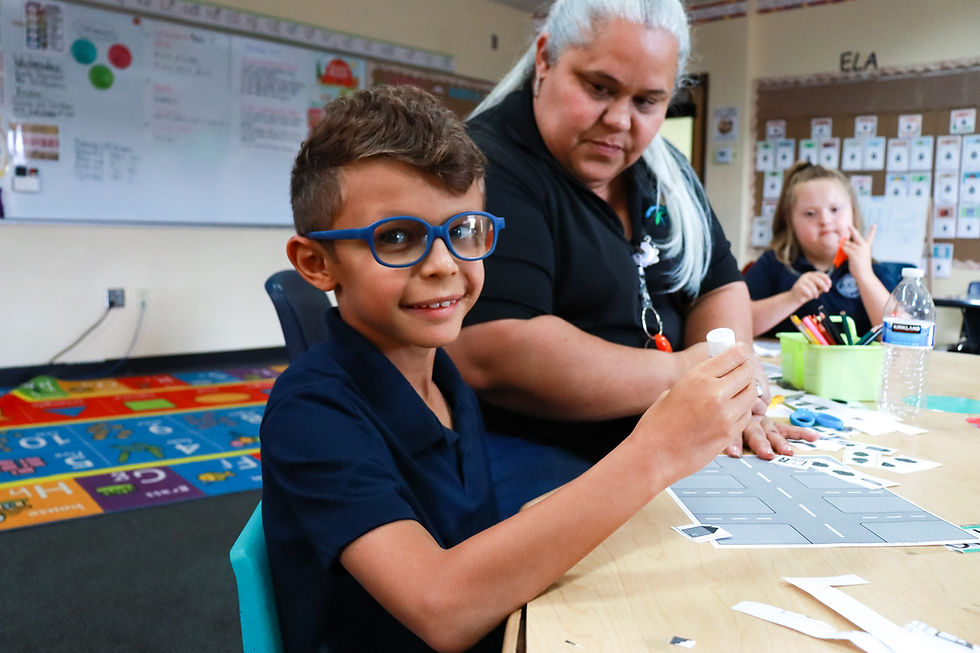How to Help Your Child Stay Curious and Become a Self-Motivated Learner
- Tania Villalon

- Oct 10, 2025
- 4 min read
Updated: Nov 11, 2025
Written By: Cassidy Gibson-Cooper, Parenting Central

Curiosity isn’t just a trait—it’s a momentum. It’s the spark that keeps kids asking “why,” even when the answers are messy or slow to come. But curiosity doesn’t survive on its own. It needs air. It needs space. And it needs parents who know when to back off, when to step in, and how to get out of the way without disappearing. If your goal is to raise a child who doesn't need constant pushing, who wants to understand the world without being told to, then you’re not managing a process—you’re nurturing a mindset. Here's how to make that mindset feel like home.
Start with How Motivation Actually Works
Kids don’t become self-starters because we say they should. The brain doesn’t respond to cheerleading—it responds to friction, freedom, and relevance. According to Harvard’s Center on the Developing Child, there are science‑based strategies to motivate children that rely less on reward and more on connection. That means tying learning to real-life problems, letting them fail without shame, and anchoring tasks in purpose instead of performance. Motivation sticks when children believe their input has weight. You’re not just praising effort; you’re making room for it to matter.
Let Them Choose—Even When It's Sloppy
There’s a huge difference between being supportive and being controlling. One builds capacity; the other builds compliance. Autonomy begins in the little things—what book to read, what question to explore, what route to try first. When children are offered meaningful choices and autonomy, they begin to feel their own decisions shaping outcomes. The messiness of this is where the learning lives. When parents micromanage, they clip the very thing they claim to be encouraging. Choice isn't chaos. It’s the rehearsal space for future self-direction.
Don’t Bribe Curiosity—It’s Already There
The fastest way to drain the joy from discovery? Pay for it. The overjustification effect is a well-documented phenomenon: when kids are rewarded for something they already enjoy, they start doing it for the reward, not for the activity. That’s why a child who once loved drawing stops sketching when there’s no gold star at the end. Motivation built on praise or prizes becomes brittle. Instead of asking, “How do I get them to do this?”, start asking, “How do I protect what they already want to do?”
Mirror What You Want Them to Reflect
You can't fake curiosity. You either live it, or you don't. Children are expert mimic machines—they watch not just what we say, but what we spend time on, what excites us, what pulls us in after dinner and keeps us awake at night. If they see that parents exhibit lifelong curiosity, they won’t need a lecture about it. They’ll internalize the rhythm of discovery. This doesn’t mean pretending to love geology if you don’t. It means showing them how to follow questions that don’t have easy answers—and letting them see you get stuck, work through it, and keep going anyway.
Help Them Think About Thinking
Metacognition—the ability to reflect on how you’re learning—isn’t something kids just figure out on their own. It has to be named. Practiced. Modeled. Research shows that metacognitive awareness enhances learning by helping children build an inner voice that knows when to press forward, when to ask for help, and when to regroup. It's not about perfection. It’s about building the skill to recognize, “I don’t understand this yet, and that’s okay.” If you want your child to stay curious, help them build that voice—the one that tells them learning is a process, not a performance.
Teach Strategies That Build Confidence Over Time
Reflection is powerful. But so is structure. Kids benefit when they’re taught how to plan, monitor, and evaluate their learning—especially when tasks get hard. According to a recent study, students who use metacognitive strategies to improve learning don’t just perform better; they persist longer and recover faster when frustrated. Show your child how to break tasks into chunks, track progress, and revise their approach when stuck. These aren’t just academic tricks—they’re mental scaffolds. And once internalized, they work across every domain of life, not just homework.
Consider Learning the Science Behind the Struggle
Some parents feel the pull to go deeper. Not just to help their child learn—but to understand how learning works from the inside out. If you’ve ever felt like you needed stronger tools, clearer insight, or even a formal foundation to support your child’s development, it may be time to pursue an online psychology degree. A deeper understanding of child psychology can transform not just your parenting, but your relationship with learning itself. It’s one thing to support curiosity—it’s another to truly know what drives it.
Curiosity can’t be scheduled. Self-motivation can’t be forced. What you can do—what matters most—is to create the kind of environment where these things feel normal. Talk less. Listen more. Let silence stretch. Allow detours. Model wonder. And above all, give your child the message that they are capable of leading their own learning—not someday, but now. Because once they believe that? They will.
Discover how UCP Charter Schools are unlocking children’s potential with inclusive, tuition-free education. Visit the website to learn more about our programs and how we empower every child to succeed!




Comments